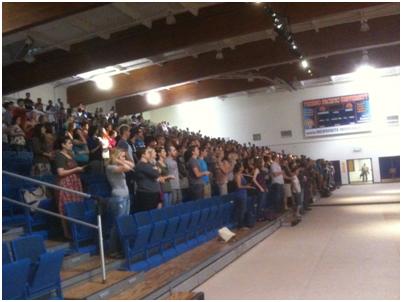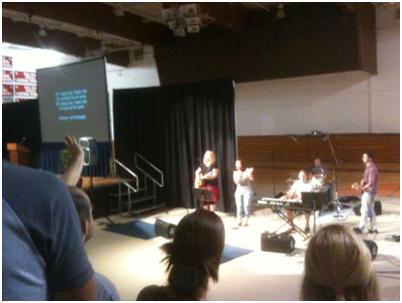Worship and Education
Worship and Education
“College Hour” is FPU’s equivalent of Chapel. This year we have many more students in attendance—it has jumped from 200-300 to 500 plus. Our Spiritual Formation and Student Life teams have joined together to move worship to the Special Events Center, to bring new energy to the effort, and more speakers with different voices. The music teams are phenomenal.
College Hour is not required of all students, but all are registered for it automatically. If they attend once a week through a semester they receive a half-unit of credit. If not they get a “no credit” on their transcript. At many of our sister schools chapel is required. FPU’s Mennonite heritage emphasizes the voluntary nature faith commitments and worship. Our faculty then recommended not to require College Hour, but to offer an incentive for attendance.


For many today, the question is not voluntary vs. required, but whether and how worship and education go together at all. It seems odd in our current intellectual climate. Education is understood to be a secular or rational enterprise; religious commitment is often understood as personal, emotional, and private. Even if we emphasize the desire to form community, this can be done in a variety of ways through on and off campus events, volunteer projects or service, or athletics and other co-curricular experiences. So what is the reason we include worship as part of our academic work?
The English philosopher and novelist of the last generation, Iris Murdoch, in The Sovereignty of the Good noted that people who pray seem to exhibit certain “good” characteristics. Those who pray step out of themselves and their particular concerns. They recognize something above and beyond themselves, and they are concerned for others. Prayer, typically a religious exercise, encourages people in becoming good. Murdoch was not a Christian, but notes that something is happening here that is important for our understanding of our personal ethical development.
We have seen a lot of ink spilt over the last couple of decades regarding how we can educate students in values and ethics. It might seem then that our assumptions about the secular nature of education works against our desire to educate people in values and ethics. And so it might seem that schools in which prayer and worship are a part of institutional culture have an advantage in educating students ethically and for faculty and staff as well. Rationality and secularity are a limited way of understanding education. We may learn skills or professional qualifications, but not these are not enough to educate the whole person, and not in those characteristics that we recognize as “good.”
But let’s add in a couple more factors. What if prayer and worship do not just take us out of ourselves and help us think of others? What if there really is a God who is here to worship, who responds to prayer and who in some way enlivens and empowers those who approach toward what is good? Christians call this grace. And what if we really do want to educate in values and ethics, and not just in rational processes and professional skills? What if we desire to build a community to nurture the spiritual and ethical character of persons? The implied answer to all of these questions is, of course, in the affirmative. Worship then should be, as it is here at FPU, a central part of our education.





Innovative thinking is the main and important aspect that will get the creative spark out.
As gr8 post it is. Many people can also earn by blogging, learn he basic and spread the knowledge of blogging…